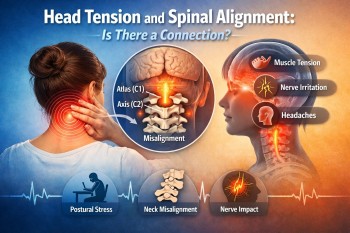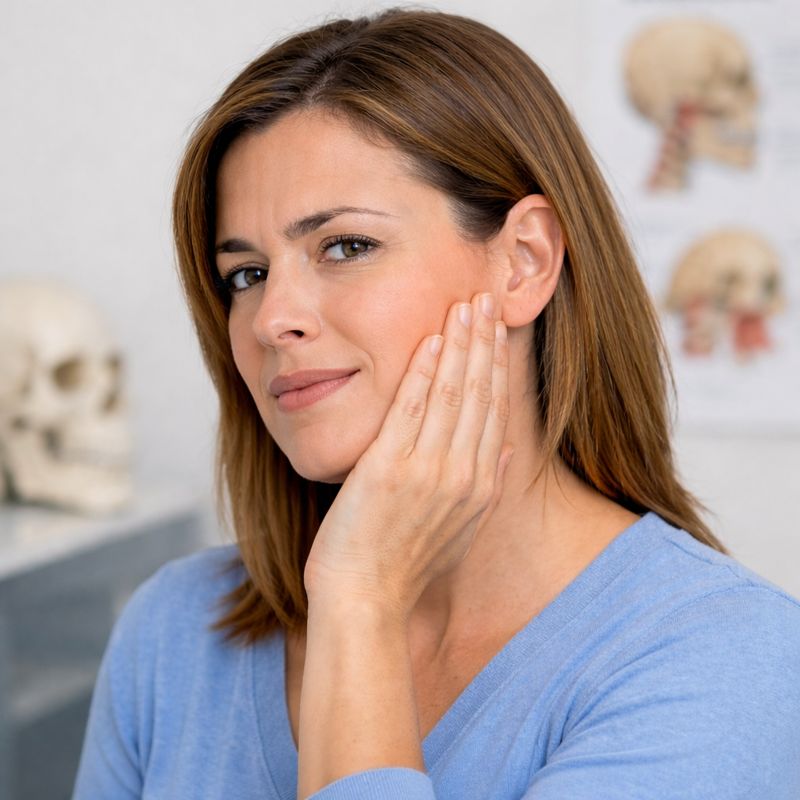
Many people who suffer from facial pain, jaw pain, and ear pain have a tough time differentiating what syndrome they suffer from TMJ or TN. With the advent of Google, it has become easy to become bombarded with too much info.
Unfortunately, for many who suffer from pain syndromes like tmj and trigeminal neuralgia, getting a proper diagnosis can be difficult. In our Wasco upper cervical Blair office, we have seen cases that have suffered for 7 years before being properly diagnosed with trigeminal neuralgia.
This blog isn't about the diagnosis but more about the underlying cause of these conditions and what you can do about it. First, we will briefly describe each condition and how they can interrelate. Then we will delve into how upper cervical spine injury can be the root cause of both of these conditions.
Trigeminal Neuralgia and TMJ - what's the difference?
While TMJ and trigeminal neuralgia can have similarities, they are very different in their mechanism of cause and how they present symptomatically.
TMJ - Temporomandibular Joint Dysfunction
Tmj is a condition in which the muscles of mastication are imbalanced and cause the TMJ joint to no longer fit as it was designed. This often leads to pain at the TMJ, cracking or popping while eating, ear pain, and eating difficulty if severe enough.
The pain experienced by TMJ suffers worse while eating and is often described as a deep-seated ache. It is also often described as a sharp shooting pain inside of the joint itself. Usually, TMJ pain does not hurt unless the person is chewing or using the jaw joint.
Underlying Mechanism of Tmj DysfunctionMost
TMJ dysfunction is due to an imbalance in the muscles that perform chewing. The trigeminal nerve, the fifth cranial nerve, is responsible for the tonicity of the mastication muscles.
If the upper cervical spine has been misaligned by prior trauma, it can result in abnormal trigeminal nucleus function resulting in imbalanced mastication muscle tone. When this occurs, it predisposes the person to be affected by TMJ problems.
Other underlying causes of TMJ problems are malformations of the joint itself, congenital, asymmetries of the mandible, and blunt trauma that directly affects the TMJ. In these cases, minor surgical intervention, TMJ dental specialist treatment, and orthotics can be helpful.
Trigeminal Neuralgia- How Does it Present?
Oftentimes people suffering from TMJ mistakingly get categorized as having trigeminal neuralgia (TN). TN is an excruciating condition that produces sharp electrical pain that can bring the patient to their knees or the brink of suicide quite quickly.
In our San Joaquin upper cervical office, we have seen numerous cases that have only suffered for a few days, and the patient exclaimed once recovered that suicide entered their minds within the first few hours of dealing with the symptoms. TN is called the suicide disease because its intensity is unmatched and far exceeds anything experienced by TMJ sufferers.
TN symptoms can be so severe that the patients can be doped up on strong anti-seizure medication without relief. Some cases experience "shocks" set by wind, cool air, brushing the face gently, and other minor activities. The shock-type pain is severe, quickly leaves ( lasting a second to 15 seconds), and often those who suffer have severe PTSD waiting for the next jolt.
Trigeminal Neuralgia is due to the Trigeminal nerve being compromised, and the effect is these terrible pain symptoms. Thankfully upper cervical chiropractic has afforded the large majority of these cases relief, and in many cases, the patient can reduce or get rid of their medication altogether.
Of course, this is achieved by working closely with the doctor who prescribed the medication. You NEVER want to cold turkey strong medication that is used with TN cases.
TN Mechanism and Cause
There are several theories as to what causes TN. In some cases, vascular decompression surgery has been helpful. The theory is that a vein entraps the Trigeminal nerve, where it exits the brainstem. This can compress the nerve and lead to this horrible condition. Decompression surgery is performed to relieve the veins entrapment of the TN nerve. While this is successful in some cases, this theory does not explain the relief that many find following precision correction of the upper cervical spine.
Neck Misalignment and TN
It is only a theory at this point, but there appears to be an interplay between an upper cervical spinal misalignment and TN symptoms. Because the brainstem houses the Trigeminal nucleus, it is thought that a spinal misalignment in the neck irritates the brainstem leading to a cascade of postural and neurophysiological problems. This cascade of effects can lead to TN and lead other chronic health problems. (1)
What Exactly Does a Blair Upper Cervical Doctor Do?
Cervical doctors are specially trained to locate spinal misalignments in the upper cervical spine and correct them. Spinal misalignment is located by running a battery of neurological tests that locate the spinal segments that have been injured and misaligned by a prior neck injury.
Once located, precision imaging in the form of digital x-ray or cone-beam computed tomography (Cbct) is used to precisely determine which joint has misaligned and the angulation of the misaligned joint.
Each person’s anatomy is different, and therefore imaging is used to uncover the blueprint to correct each patient’s individual misalignment pattern. Once this information is gleaned, a gentle, light correction is made without twisting, popping, or pulling.
The patient is then monitored over time to ensure that the correction is holding. If the testing indicates the need for another correction, then it is performed.
However, the goal of Blair Upper Cervical Care is for the patient to stay in “adjustment.”It isn’t the correction that produces healing. It removes nerve irritation and the adjustment “holding” in its normal position that allows the body to function better and proceed through a healing process. This is how Blair Chiropractic treatment for TMJ and TN can aid your body in healing itself.
If you suffer from TMJ or TN or any other chronic degenerative disease, give upper cervical care a chance. You will be glad you did.
References
1.https://www.ncbi.nlm.nih.gov/m/pubm. ed/21970155







Leave a comment